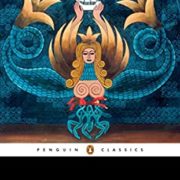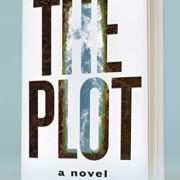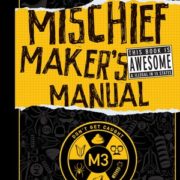Nasty, Brutish, and Short: Adventures in Philosophy with My Kids by Scott Hershovitz
At the risk of alienating some readers right from the jump, I’ll go ahead and say that having children in your life is a blast, especially during the toddler years. My son and daughter are well past this age, but I revered being a part of their daily soaking up the world anew. All children are naturally curious of course. And all parents are exquisitely charged with introducing the world to them. It often feels just as much to our benefit as it is to theirs. For we too see the world anew and try to hold back any reflexive jadedness.
Scott Hershovitz, author of Nasty, Brutish, and Short: Adventures in Philosophy with My Kids, more than runs with his children’s curiosity: He’s teaching them how to think. Granted, when I first stumbled upon this book, I was dubious, thinking it would be too cute by half. You know, one of those “look at me as I try to learn/teach something with/to my kids and end up making a royal mess of it, all in an attempt to be humorous” books. But then I read the introduction. Hershovitz is a philosophy professor at the University of Michigan and clearly divulges his intent. “This book is inspired by kids, but it’s not for them. In fact, kids are my Trojan horse. I’m not after young minds. I’m after yours.” After reading that, I was all in.
Hershovitz maintains that all kids are philosophers not only because they ask “why” a whole heck of a lot but also from their need to know what’s in your mind. When your young daughter, for instance, asks what the color red looks like to you, she’s unknowingly carrying forward seventeenth-century philosopher John Locke’s shifted color spectrum question. She’s trying to make sense of what she sees by asking how you see it. It’s a deep question because she’s not only trying to understand her own consciousness but yours as well. As we get older, Hershovitz says we tend to stop asking such questions because we stopped seeing them as viable questions to ask. Given the difficulty—perhaps even the ineffability—of conveying what we experience, it’s understandable that we stop asking. Yet doing so trucks a price: often not understanding each other.
As a philosophy professor, Hershovitz is well poised to lead his young sons in practicing philosophy. He’s constantly asking them questions so that they have to think and reason through, well, just about everything. (A few times I thought, “Maybe ease up a little, yeah?”) But, as he said, the conversations he has with his kids are the set up for the broader topics. Thankfully, the exchanges are often humorous. (If you do pick up the book, you’ll behold a fair amount of cursing. Not only does Hershovitz admit that he curses freely, he makes the case for it. To wit: studies showing better group cohesion when cursing is allowed; also, people are better able to withstand physical pain when in the act of cursing. He has a whole chapter on language.)
In the chapter on “rights,” Hershovitz introduces a rather famous contemporary philosophical puzzle: the Trolley Problem. It goes like this. A runaway trolley car is careening down the track and will certainly kill five oblivious rail workers farther down. But you happen to be standing by the switch that can divert the car down another track. Unfortunately, there’s one worker on that track who will be killed if you, the Bystander at the Switch, redirect the trolley. What do you do? Allow five to die, or save five by actively killing one? Pose the question to whomever. I asked my teen-aged kids and found out that my 14-year-old already knew of the puzzle. So it didn’t take long for “what ifs” to fly. What if you knew the one solitary worker had a terminal illness? Would knowing this change your decision? What if one of the workers was a beloved relative (or a sworn enemy)? The broader question here is what rights do all of these workers have as they relate to your actions? “When you have a right, someone else has an obligation,” says Hershovitz. However, as we know, defining rights and obligations can be a tenuous endeavor. Yet they can’t be ignored. It’s why we debate such things as bioethics and the rules of war.
One day, one of Hershovitz’s sons confided that he was called a floofer doofer by a preschool classmate. (No one knows what a floofer doofer is. What is known, ostensibly, is that you don’t want to be called one.) While the details are sketchy, Hershovitz’s son retaliated in some fashion as he received a mild scolding from his teacher. Hershovitz did not scold his son nor lecture him about avoiding the temptation to retaliate. He has little use for the old saw “two wrongs don’t make a right.” To him, not only can the second wrong “set things right,” it probably shouldn’t even be called a wrong at all. The second wrong could, in fact, be called justice. It’s why we have a legal system, notes Hershovitz, who is also a law professor at Michigan. (He clerked for Ruth Bader Ginsburg.) He makes the case that, broadly speaking, “litigation is the best substitute for revenge.” And it can do double duty: rule against the wrongdoer and send a message to others that said wrongdoing will not be tolerated.
If this sounds basic and obvious, recall that Hershovitz is asking us to revisit concepts upon which we’ve set as our foundation, providing just enough conceptual history to add continuity. For instance, we learn of Aristotle’s thoughts on justice and Immanuel Kant’s theory on rights. This helps with understanding our institutions along with our more prosaic daily interactions. The questions start as basic, sure, but the answers are certainly not always obvious. Or, an answer may at first seem obvious to you but not to me. It’s not that I don’t understand your answer. I just have a few questions for how you arrived at the answer. And then we’re off.
As the book progresses, other traditional philosophical ideas are briefly explored, such as knowledge and truth. In the wrong hands, this thorough fare could be an arid one. But Hershovitz knows his audience and keeps it relatable. He describes, for example, how René Descartes’ theory of justified true belief once ruled the day among philosophers and for quite some time. You know something because you are justified in believing it true. But then, in 1963, a little known philosopher by the name of Edmund Gettier published a brief paper that upended this theory. Here’s my mashed-up version of his counterexample. You own a copy of Infinite Jest by the (great) David Foster Wallace. You’ve picked it up and read from it many times. You can even visualize where it sits on your bookshelf. Therefore, you are justified in believing that a copy of Infinite Jest is in your house. Indeed, there is a copy in your house. But here’s what you don’t know. Your spouse loaned out your copy to someone a few weeks ago. This someone then lost it. But then someone else just so happened to buy you a copy for your birthday (thinking you didn’t own it already) and mailed it to you. It’s sitting, wrapped, on your dining room table. Gettier would argue that you just got lucky there’s a copy in your house. But you actually didn’t know there was a copy in your house.
If the title of Hershovitz’s book sounds familiar, it comes from seventeenth-century philosopher Thomas Hobbes, who believed that with the absence of government, humans are back in the state of nature, where life is “solitary, nasty, brutish, and short.” And regarding government, Hershovitz makes the case that it’s not perceived oppressive governmental entities one needs to worry about (in the U.S. anyway). To him, legally speaking, it’s your employer. And there’s much else he covers, such as Cartesian dualism (back to Descartes again) and the subsequent “the ghost in the machine” derision that eventually followed.
Speaking of dualism, there’s a bit of that in Hershovitz’s approach. On the one hand, he absolutely steps back so that his sons (and others) think through an idea without undue persuasion. Yet, on the other hand, there are times when he seems to positively relish ending a debate by bringing down his tremendous intellect.
Whether you regularly engage with children or not, Hershovitz’s book is a reminder that the study of philosophy is frequently an exploration of how much we don’t know. And that’s okay. Often, through the process of learning what we don’t know, we actually learn quite a lot.











